新概念英语第二册:第21课课文详解及语法解析
- 格式:docx
- 大小:38.96 KB
- 文档页数:5
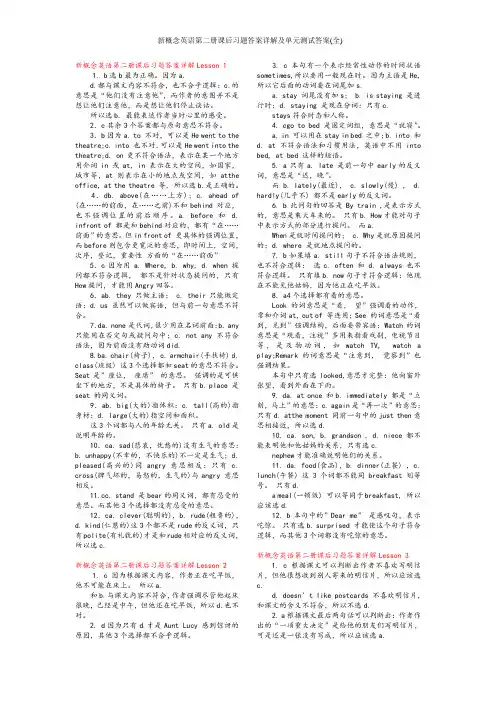
新概念英语第二册课后习题答案详解Lesson 11. b选b最为正确。
因为a.d.都与课文内容不符合,也不合乎逻辑;c.的意思是“他们没有注意他”,而作者的意图并不是想让他们注意他,而是想让他们停止谈话。
所以选b. 最能表达作者当时心里的感受。
2.c其余3个答案都与原句意思不符合。
3.b因为a. to 不对,可以是He went to the theatre;c. into 也不对,可以是He went into the theatre;d. on更不符合语法,表示在某一个地方用介词in 或at, in 表示在大的空间,如国家,城市等,at 则表示在小的地点或空间,如atthe office, at the theatre 等, 所以选b.是正确的。
4.db. above(在……上方);c. ahead of (在……的前面,在……之前)不和behind 对应,也不强调位置的前后顺序。
a. before 和 d. infront of 都是和behind对应的,都有“在……前面”的意思。
但in front of 更具体的强调位置,而before则包含更宽泛的意思,即时间上,空间,次序,登记,重要性方面的“在……前面”5.c因为用 a. Where, b. why, d. when 提问都不符合逻辑,都不是针对状态提问的,只有How提问,才能用Angry回答。
6.ab. they 只做主语; c. their只能做定语;d. us 虽然可以做宾语,但与前一句意思不符合。
7.da. none是代词,很少用在名词前面;b. any 只能用在否定句或疑问句中;c. not any 不符合语法,因为前面没有助动词did.8.ba. chair(椅子), c. armchair(手扶椅) d. class(班级) 这3个选择都和seat的意思不符合。
Seat是”座位,座席”的意思。
强调的是可供坐下的地方,不是具体的椅子。
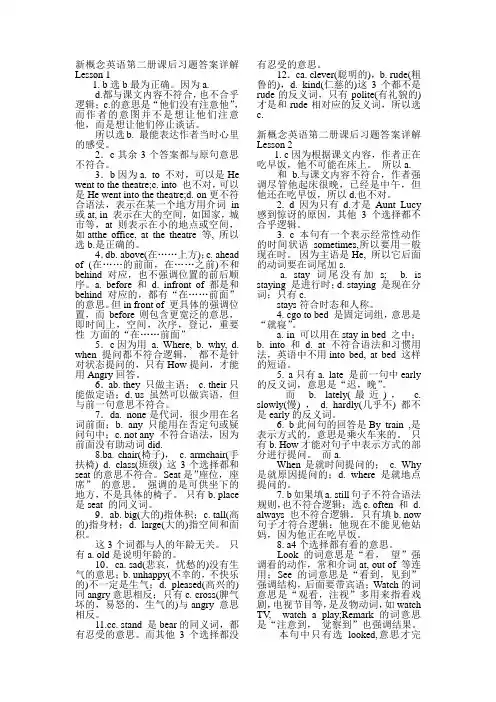
新概念英语第二册课后习题答案详解Lesson 11. b选b最为正确。
因为a.d.都与课文内容不符合,也不合乎逻辑;c.的意思是“他们没有注意他”,而作者的意图并不是想让他们注意他,而是想让他们停止谈话。
所以选b. 最能表达作者当时心里的感受。
2.c其余3个答案都与原句意思不符合。
3.b因为a. to 不对,可以是He went to the theatre;c. into 也不对,可以是He went into the theatre;d. on更不符合语法,表示在某一个地方用介词in 或at, in 表示在大的空间,如国家,城市等,at 则表示在小的地点或空间,如atthe office, at the theatre 等, 所以选b.是正确的。
4.db. above(在……上方);c. ahead of (在……的前面,在……之前)不和behind 对应,也不强调位置的前后顺序。
a. before 和 d. infront of 都是和behind对应的,都有“在……前面”的意思。
但in front of 更具体的强调位置,而before则包含更宽泛的意思,即时间上,空间,次序,登记,重要性方面的“在……前面”5.c因为用 a. Where, b. why, d. when 提问都不符合逻辑,都不是针对状态提问的,只有How提问,才能用Angry回答。
6.ab. they 只做主语;c. their只能做定语;d. us 虽然可以做宾语,但与前一句意思不符合。
7.da. none是代词,很少用在名词前面;b. any 只能用在否定句或疑问句中;c. not any 不符合语法,因为前面没有助动词did.8.ba. chair(椅子), c. armchair(手扶椅) d. class(班级) 这3个选择都和seat的意思不符合。
Seat是”座位,座席”的意思。
强调的是可供坐下的地方,不是具体的椅子。
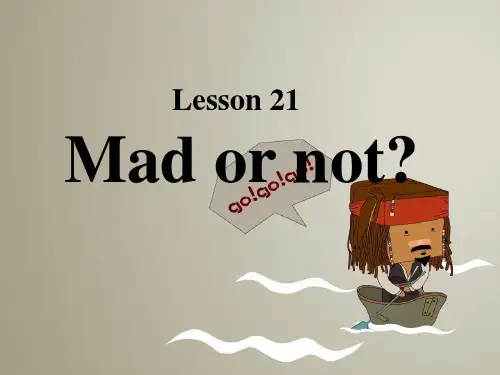
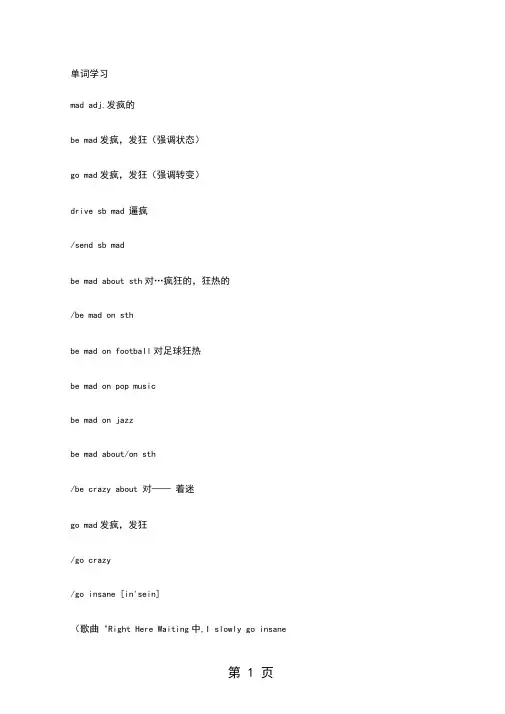
单词学习mad adj.发疯的be mad发疯,发狂(强调状态)go mad发疯,发狂(强调转变)drive sb mad 逼疯/send sb madbe mad about sth对…疯狂的,狂热的/be mad on sthbe mad on football对足球狂热be mad on pop musicbe mad on jazzbe mad about/on sth/be crazy about 对——着迷go mad发疯,发狂/go crazy/go insane [in'sein](歌曲"Right Here Waiting中,I slowly go insanethe insane精神病人go bananas (sl.) become mad or angry, act very foolishl 泼疯,发怒,傻里傻气go nuts发疯nut: (sl.) foolish, eccentric or mad personmental patient精神病患者mental hospital精神病医院like mad 拼命地,猛烈地,疯狂地reason1) n.原因reasonable adj合情合理的,良好的,尚可的at a reasonable pric艰合理的价格eg. The plane is in a reasonable condition^ 机的状态良好cause#致某事发生的起因the cause of the fire大火的起因eg. Smoking is one of the causes of lung cance吸烟是肺癌的起因之——。
reason1)n.原因for this reason由于这个原因for some resson由于某个原因(some:某一个,加可数名词单数)/for a certain reasongive a reason!出理由the root reason艮本原因the reason is that 理由是•…the reason why …is that…由勺理由是…eg. The reason why I study English is that I envy those who speak English well.我学习英语的理由是我羡慕那些讲英语很好的人。
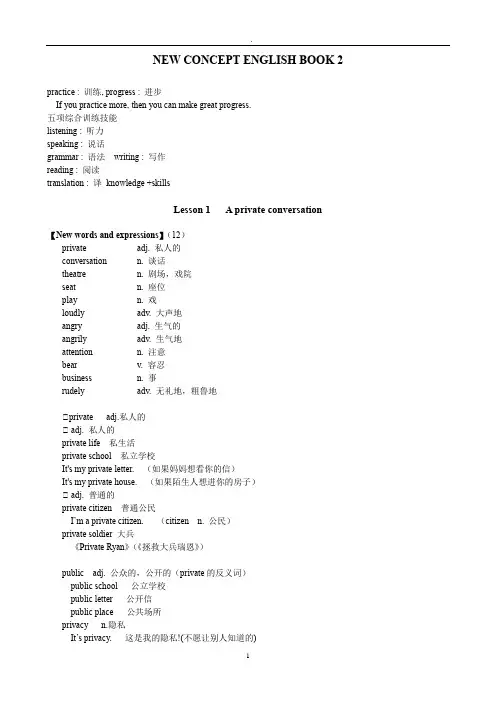
NEW CONCEPT ENGLISH BOOK 2practice : 训练, progress : 进步If you practice more, then you can make great progress.五项综合训练技能listening : 听力speaking : 说话grammar : 语法writing : 写作reading : 阅读translation : 译knowledge +skillsLesson 1 A private conversation【New words and expressions】(12)private adj. 私人的conversation n. 谈话theatre n. 剧场,戏院seat n. 座位play n. 戏loudly adv. 大声地angry adj. 生气的angrily adv. 生气地attention n. 注意bear v. 容忍business n. 事rudely adv. 无礼地,粗鲁地★private adj.私人的★ adj. 私人的private life 私生活private school 私立学校It's my private letter. (如果妈妈想看你的信)It's my private house. (如果陌生人想进你的房子)★ adj. 普通的private citizen 普通公民I’m a private citizen. (citizen n. 公民)private soldier 大兵《Private Ryan》(《拯救大兵瑞恩》)public adj. 公众的,公开的(private的反义词)public school 公立学校public letter 公开信public place 公共场所privacy n.隐私It’s privacy. 这是我的隐私!(不愿让别人知道的)★conversation n.谈话have a + talk/chat/dialogue/conversation/gossip 名词变动词conversation 一般用于正式文体中, 内容上往往不正式subject of conversation 话题They are having a conversation.talk 内容可正式可不正式, 也可以私人Let’s have a talk.dialogue 对话, 可以指正式国家与国家会谈China and Korea are having a dialogue.chat 闲聊,就是北京人说的“侃”,说的是无关紧要的事。
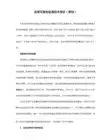
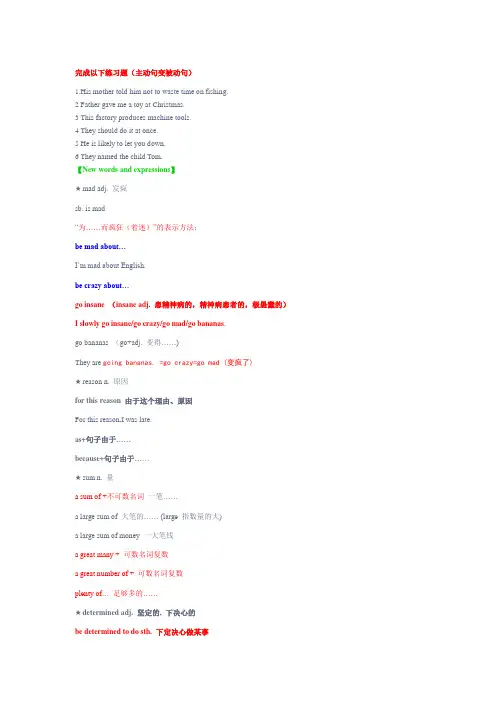
完成以下练习题(主动句变被动句)1.His mother told him not to waste time on fishing.2 Father gave me a toy at Christmas.3 This factory produces machine tools.4 They should do it at once.5 He is likely to let you down.6 They named the child Tom.【New words and expressions】★mad adj. 发疯sb. is mad“为……而疯狂(着迷)”的表示方法:be mad about…I’m mad about English.be crazy about…go insane (insane adj. 患精神病的,精神病患者的,极愚蠢的)I slowly go insane/go crazy/go mad/go bananas.go bananas (go+adj. 变得……)They are going bananas. =go crazy=go mad (变疯了)★reason n. 原因for this reason 由于这个理由、原因For this reason,I was late.as+句子由于……because+句子由于……★sum n. 量a sum of +不可数名词一笔……a large sum of 大笔的…… (large 指数量的大)a large sum of money 一大笔钱a great many + 可数名词复数a great number of + 可数名词复数plenty of… 足够多的……★determined adj. 坚定的, 下决心的be determined to do sth. 下定决心做某事make up one's mind 下定决心decide to do sth. 决定做……make a decision to do sth. 决定做……determine v.下定决心【课文讲解】1、Mad or not? = mad or not mad?or not 在疑问词的后面,表示“是还不是”,选择概念2、Aeroplanes are slowly driving me mad.drive sb. mad 逼某人发疯You are driving me mad.The teacher is slowly driving me mad.3、I live near an airport and passing planes can be heard night and day.night and day 日日夜夜,夜以继日(注意连读)passing planes 过往飞机(passing是现在分词,作定语,起形容词作用,修饰planes,“经过的(路过),过往的”)He forgot the man with passing time. 随着时间的消逝,他忘掉了那个人。
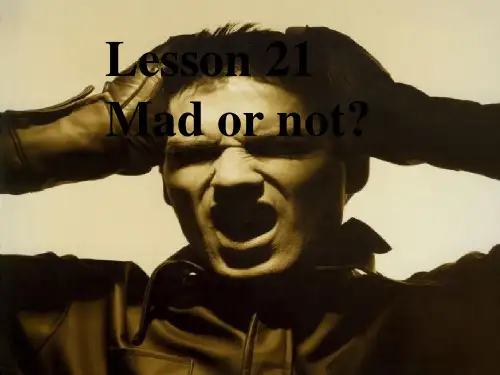

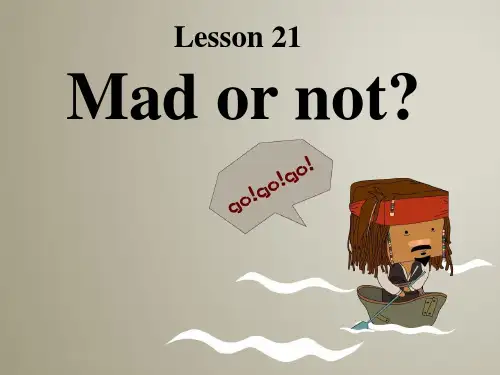
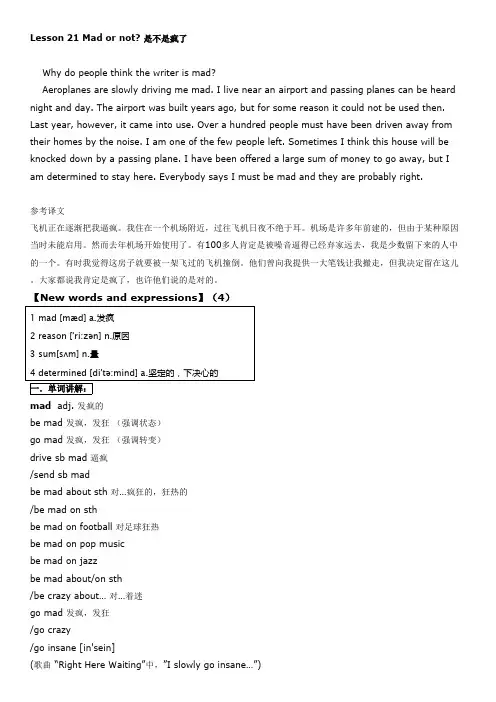
Lesson 21 Mad or not? 是不是疯了Why do people think the writer is mad?Aeroplanes are slowly driving me mad. I live near an airport and passing planes can be heard night and day. The airport was built years ago, but for some reason it could not be used then. Last year, however, it came into use. Over a hundred people must have been driven away from their homes by the noise. I am one of the few people left. Sometimes I think this house will be knocked down by a passing plane. I have been offered a large sum of money to go away, but I am determined to stay here. Everybody says I must be mad and they are probably right.参考译文飞机正在逐渐把我逼疯。
我住在一个机场附近,过往飞机日夜不绝于耳。
机场是许多年前建的,但由于某种原因当时未能启用。
然而去年机场开始使用了。
有100多人肯定是被噪音逼得已经弃家远去,我是少数留下来的人中的一个。
有时我觉得这房子就要被一架飞过的飞机撞倒。
他们曾向我提供一大笔钱让我搬走,但我决定留在这儿。
大家都说我肯定是疯了,也许他们说的是对的。
【New words and expressions】(4)1 mad [mæd] a.发疯2 reason ['ri:zən] n.原因3 sum[sʌm] n.量4 determined [di'tə:mind] a.坚定的,下决心的一.单词讲解:mad adj. 发疯的be mad 发疯,发狂(强调状态)go mad 发疯,发狂(强调转变)drive sb mad 逼疯/send sb madbe mad about sth 对…疯狂的,狂热的/be mad on sthbe mad on football 对足球狂热be mad on pop musicbe mad on jazzbe mad about/on sth/be crazy about… 对…着迷go mad 发疯,发狂/go crazy/go insane [in'sein](歌曲 “Right Here Waiting”中,”I slowly go insane…”)给大家推荐一个英语微信群-Empty Your Cup英语微信群是目前学习英语最有效的方法,群里都是说英语,没有半个中文,而且规则非常严格,是一个超级不错的英语学习环境,群里有好多英语超好的超牛逼的人,还有鬼佬和外国美眉。
新概念英语2逐句精讲Lesson19~21新概念英语2逐句精讲Lesson191.‘The play may begin at any moment,' I said.‘It may have begun already,' Susan answered.“戏马上就要开演了,”我说。
“说不定已经开演了呢”苏姗回答说。
语言点比较学习:must be (可能性大):He must be a teacher. 他很可能是一名教师。
may be (可能性稍小):He may be a teacher.他也许是一名教师。
2.‘I hurried to the ticket-office.'May I have twotickets please ?' I asked.我匆匆赶到售票处,问:“我能够买两张票吗?”语言点 hurry to somewhere指匆忙赶到某地,如果想催促某人“快点”,能够这样说:Come on.赶快。
/ Hurry!快点!/ You’retoo slow.你太慢了。
/ Can you go any faster? 你能走快点吗?/ We are running out of time.没时间了 !当回答某人的催促时,通常这样说:Hold on. / Wait a minute.稍候。
/ I’m hurrying.我正在赶。
/ What’s the hurry?你着什么急啊? / I’m trying.我一直在尽力。
/Just give me a second, Fm almost done.再等一下,我快做完了。
3.‘I'm sorry, we've sold out,' the girl said.“真对不起,我们的票已经卖完了。
”那个女孩回答。
语言点表示道歉时常用以下句子:I am so sorry.真是对不起! / Please forgive me.请你原谅我。
新东方新概念英语第二册课后习题答案详解/html/2/xiangjie/list_81_2.html第13课、新东方新概念英语第二册课后习题答案详解Lesson 131. b根据课文第3-4行They will be coming…and most of the young people in town will…,只有b. mainly the young people 与课文内容相符合,而其他3个选择都不符合课文内容。
2. d根据文章第7-8行...the police will have a difficult time, they will be trying to keep order.只有d. to prevent trouble(防止麻烦)最符合文章的意思,它说明警察去那的目的,而其它3个选择都表示原因,不能准确表达文章的含义。
3. b需要选同前面句子中的most of (大多数)意思相近的词或短语。
a. A lot(许多)后面应该有of, 与most of 意思不同;c. Some(一些)不是most of 的同义词,语法上也讲不通;d. Many(许多)也不是most of 的同义词,且有语法错误;只有b. Nearly all(几乎所有的)同most of 的意思最接近,也最符合语法。
4. c只有 c. long will they be 最符合语法和题目意思。
a. long they will be 不是疑问句形式,不合乎语法规则;b. they will be 不合乎语法,也不合乎题目意思;d. long they be 不合乎语法。
5. a只有a.in才最接近前面句子中的 during 的含义,而其他3个选择都在意思上讲不通。
6. b只有b. as usual(通常)才能使这个句子意思完整,语法正确,而其他3个选择都不符合习惯用法和语法。
7. b这个句子的主语police(警察)是表示复数意义的名词,因此它后面的谓语动词应该是复数形式的。
【导语】新概念英语之所以经久不衰是因为以其全新的教学理念,有趣的课⽂内容和全⾯的技能训练,为英语学习者排忧解难,深受⼴⼤英语学习者的欢迎和喜爱。
想要学好英语的你,怎能错过?快来加⼊学习吧!⽆忧考为您提供了以下内容,希望能够为⼤家学习新概念英语提供帮助!新概念英语第⼆册Lesson19课⽂注释 1.The play may begin at any moment. 剧马上就要开演了。
The guests may arrive at any moment. 客⼈们马上就要来了。
It may/might rain(at) any moment. 这天⽓随时都可能下⾬。
2.I'm sorry, we've sold out. 对不起,票已售完。
(1)这句话中⽤了缩略形式 I'm(=I am) 和we've(=we have)。
缩略形式⼀般⽤于⼝语和⾮正式⽂体中。
在正式⽂体中要避免使⽤。
(2)sell out为固定短语,可指“(店主)售完(某种货物)” 、“(货)被售完”: They have sold out of eggs. 他们的鸡蛋卖完了。
Tickets for tonight's performance are sold out. 今晚演出的门票已售完。
3.What a pity! 真可惜! 这是⼀个常⽤的表⽰可惜、遗憾的感叹句。
我们还可以说: What a pity(it is) you can't see their performance! 你不能观看他们的演出真是遗憾! 4.I went back to the ticket office at once. 我马上⼜回到售票处。
at once 为固定短语,在这⾥可译为“马上”、“⽴刻”:When he heard the news, he went home at once. 听到这消息,他⽴刻就回家了。
新概念英语第二册:第21课课文详解及语法解析-CAL-FENGHAI.-(YICAI)-Company One1新概念英语第二册:第21课课文详解及语法解析课文详注 Further notes on the text1.I live near an airport and passing planes can be heard night and day. 我住在一个机场附近,过往飞机日夜不绝于耳。
(1)passing 是现在分词,作形容词用,表示“经过的”、“过往的”:He stopped a passing car.他挡住了一辆过往汽车。
He forgot the man with passing time.随着时间的消逝,他忘掉了那个人。
(2)night and day是固定短语,意为“日日夜夜”、“夜以继日”:He thought of the matter night and day.他日夜在想这个问题。
He worked night and day.他夜以继日地工作。
2.The airport was built years ago, but for some reason it could not be used then. 机场是很多年前建的,但因为某种原因当时未能启用。
(1)years 前面不加确定的数词时,一般表示“很多年”,weeks等的用法与它相似:He left the city years ago.他多年前就离开了这座城市。
I have not seen him for weeks.我已经有好几个星期没见他了。
(2)some 在这里不表示“一些”,而表示“某个”、“某种”等:I'll tell you someday.有一天我会告诉你的。
We'll talk about it some other time.我们改日再谈这件事。
3.…it came into use. ……机场开始使用了。
新概念英语第二册课后习题答案详解Lesson 11. b选b最为正确。
因为a.d.都与课文内容不符合,也不合乎逻辑;c.的意思是“他们没有注意他”,而作者的意图并不是想让他们注意他,而是想让他们停止谈话。
所以选b. 最能表达作者当时心里的感受。
2.c其余3个答案都与原句意思不符合。
3.b因为a. to 不对,可以是He went to the theatre;c. into 也不对,可以是He went into the theatre;d. on更不符合语法,表示在某一个地方用介词in 或at, in 表示在大的空间,如国家,城市等,at 则表示在小的地点或空间,如atthe office, at the theatre 等, 所以选b.是正确的。
4.db. above(在……上方);c. ahead of (在……的前面,在……之前)不和behind 对应,也不强调位置的前后顺序。
a. before 和 d. infront of 都是和behind对应的,都有“在……前面”的意思。
但in front of 更具体的强调位置,而before则包含更宽泛的意思,即时间上,空间,次序,登记,重要性方面的“在……前面”5.c因为用a. Where, b. why, d. when 提问都不符合逻辑,都不是针对状态提问的,只有How提问,才能用Angry回答。
6.ab. they 只做主语; c. their只能做定语;d. us 虽然可以做宾语,但与前一句意思不符合。
7.da. none是代词,很少用在名词前面;b. any 只能用在否定句或疑问句中;c. not any 不符合语法,因为前面没有助动词did.8.ba. chair(椅子),c. armchair(手扶椅) d. class(班级) 这3个选择都和seat的意思不符合。
Seat是”座位,座席”的意思。
强调的是可供坐下的地方,不是具体的椅子。
新概念英语第二册课文详解:Lesson21 Mad or not 【新概念英语第二册课文Lesson21生词和短语】sb is mad.mad 为...而疯狂be mad aboutI'm mad about English.crazy 为……而疯狂的be crazy aboutgo insanceI slowly go insance.go+adj. 变得...They are going bananas. =go crazy=go mad★reason n. 原因as+句子because+句子for this reason 因为这个理由、原因For this reason,I was late.★sum n. 量a great many + 可数名词复数a large ...a great number of + 可数名词复数plenty of 充足的a sum of 一笔a large sum of 大量的a large sum of money★dete rmined adj. 坚定的,下决心的determine v.下定决心make up one's minddecide to do sth.make a decision:decisionmake a decision to do sth.be determined to do sth.下定决心做某事Aeroplanes are slowly driving me mad. I live near an airport and passing planes can be heard night and day. The airport was built years ago, but for some reason it could not be used then. Last year, however, it came into use. Over a hundred people must have been driven away from their homes by the noise. I am one of the few people left. (暂不提供全部内容)【新概念英语第二册课文详解Lesson21】Mad or not? = mad or not mad(省略)?or not 在疑问词的后面,表示是还不是,选择概念Why do people think the writer is mad?drive sb. mad 逼某人发疯drive v. 驾驶,开车You are driving me mad.The teacher is slowly driving me mad.night and day 日日夜夜passing planes 过往飞机;pass v.passing 作定语;正在经过的sleeping baby 正在睡觉的小孩waiting car 正在等待的车be builtyears ago = many years agofor some reason 因为某个理由some + 可数名词单数;some 表示某一个some+不可数名词单数:一些 some watersome+可数名词复数:一些 some bookssome+可数名词单数:某一 some bookhowever 用于句首,句中,用逗号隔开come into use : into prep.; use n.投入使用;主动概念,没有被动式be used 被动表示被使用over a hundred ...must have done 过去发生,推测must have been done 被动。
新概念英语第二册:第21课课文详解及语法解析课文详注 Further notes on the text
1.I live near an airport and passing planes can be heard night and day. 我住在一个机场附近,过往飞机日夜不绝于耳。
(1)passing 是现在分词,作形容词用,表示“经过的”、“过往的”:He stopped a passing car.
他挡住了一辆过往汽车。
He forgot the man with passing time.
随着时间的消逝,他忘掉了那个人。
(2)night and day是固定短语,意为“日日夜夜”、“夜以继日”:He thought of the matter night and day.
他日夜在想这个问题。
He worked night and day.
他夜以继日地工作。
2.The airport was built years ago, but for some reason it could not be used then. 机场是很多年前建的,但因为某种原因当时未能启用。
(1)years 前面不加确定的数词时,一般表示“很多年”,weeks 等的用法与它相似:
He left the city years ago.
他多年前就离开了这座城市。
I have not seen him for weeks.
我已经有好几个星期没见他了。
(2)some 在这里不表示“一些”,而表示“某个”、“某种”等:
I'll tell you someday.
有一天我会告诉你的。
We'll talk about it some other time.
我们改日再谈这件事。
3.…it came into use. ……机场开始使用了。
come into use 为固定短语,表示“开始被使用”:
When did the train come into use?
这火车什么时候开始使用的?
The road came into use last month.
这条路上个月通车了。
4.Over a hundred people must have been driven away from their homes by the noise. 有一百多人肯定是被噪音逼得已经弃家
远去。
情态动词 must +be表示根据事实所作的推论,这在第1册第
127课已经讲过。
在这句话中,must+完成时态表示对过去某事的推测:This pen is John's. He must have been here.
这枝钢笔是约翰的。
他一定来过这里。
5.I am one of the few people left. 我是少数留下来的人中
的一个。
(1)one of表示特指的一群人/一些东西中的一个,后面的名词用复数:
One of the girls standing over there is Tim's sister.
在那些站在那儿的女孩当中有一个是蒂姆的姐姐/妹妹。
You can take one of these bags.
你能够从这些提包中拿走一个。
(2)left相当于who are left(by the others)。
即其他人走了以后而留下了他们。
语法 Grammar in use
被动语态(2)
在第10课的语法中,我们已经讲了被动语态的基本形式以及它在用了一般现在时、现在完成时、现在实行时和一般过去时的句子中的使用情况。
被动语态还能够和绝大部分情态动词连用(包括具有部分情态功能的will和 would)。
The mistake must be corrected immediately.
这个错误必须立即得到改正。
The shop must have been closed now.
商店现在肯定已经关门了。
He may have been told the news.
他或许已被告知这消息了。
词汇学习 Word study
1.drive
(1)vt.,vi. 驾驶,驾车:
You must have been driving at seventy miles an hour.。